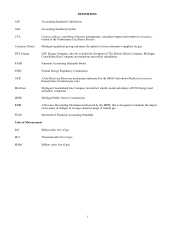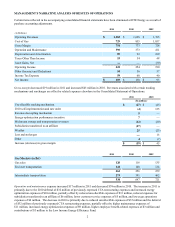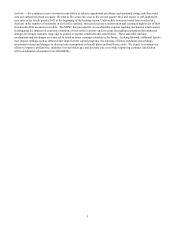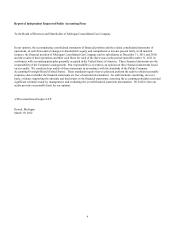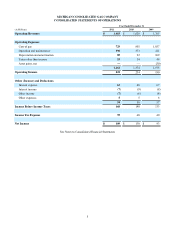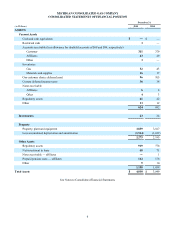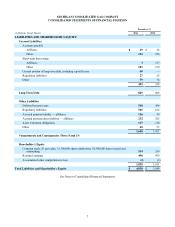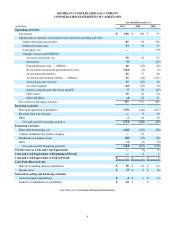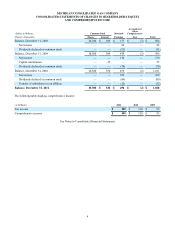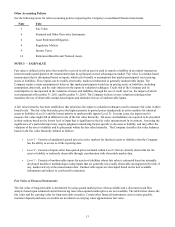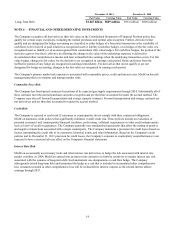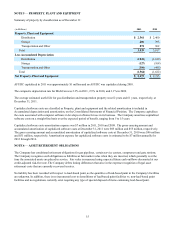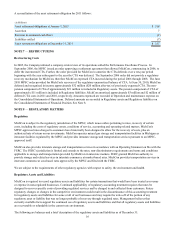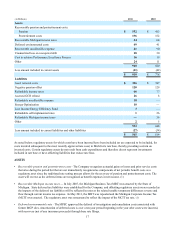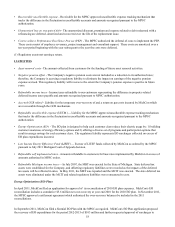DTE Energy 2011 Annual Report Download - page 13
Download and view the complete annual report
Please find page 13 of the 2011 DTE Energy annual report below. You can navigate through the pages in the report by either clicking on the pages listed below, or by using the keyword search tool below to find specific information within the annual report.
11
Comprehensive Income (Loss)
Comprehensive income (loss) is the change in Common shareholder's equity during a period from transactions and events from
non-owner sources, including net income.
(in Millions)
December 31, 2010
December 31, 2011
Net
Unrealized
Loss on
Derivatives
$(1)
$(1)
Benefit
Obligation
$(1)
$(1)
Accumulated
Other
Comprehensive
Loss
$(2)
$(2)
Cash Equivalents
Cash and cash equivalents include cash on hand, cash in banks and temporary investments purchased with remaining maturities
of three months or less.
Receivables
Accounts receivable are primarily composed of trade receivables and unbilled revenue. Our accounts receivable are stated at
net realizable value.
The allowance for doubtful accounts is generally calculated using the aging approach that utilizes rates developed in reserve
studies. The Company establishes an allowance for uncollectible accounts based on historical losses and management's
assessment of existing economic conditions, customer trends, and other factors. Customer accounts are generally considered
delinquent if the amount billed is not received by the due date, which is typically in 21 days, however, factors such as
assistance programs may delay aggressive action. MichCon assesses late payment fees on trade receivables based on
contractual past-due terms with customers. Customer accounts are written off when collection efforts have been exhausted,
generally one year after service has been terminated.
Unbilled revenues of $110 million and $157 million are included in customer accounts receivable at December 31, 2011 and
2010, respectively.
Notes Receivable
Notes receivable, or financing receivables, are primarily comprised of capital lease receivables and loans.
Notes receivable are typically considered delinquent when payment is not received for periods ranging from 60 to 120 days.
The Company ceases accruing interest (nonaccrual status), considers a note receivable impaired, and establishes an allowance
for credit loss when it is probable that all principal and interest amounts due will not be collected in accordance with the
contractual terms of the note receivable. Cash payments received on nonaccrual status notes receivable, that do not bring the
account contractually current, are first applied to contractually owed past due interest, with any remainder applied to principal.
Accrual of interest is generally resumed when the note receivable becomes contractually current.
In determining the allowance for credit losses for notes receivable, we consider the historical payment experience and other
factors that are expected to have a specific impact on the counterparty's ability to pay. In addition, the Company monitors the
credit ratings of the counterparties from which we have notes receivable.
Inventories
MichCon generally values materials and supplies at average cost.
Gas inventory of $52 million and $43 million as of December 31, 2011and 2010, respectively, is determined using the last-in,
first-out (LIFO) method. At December 31, 2011, the replacement cost of gas remaining in storage exceeded the LIFO cost by
$95 million. At December 31, 2010, the replacement cost of gas remaining in storage exceeded the LIFO cost by $147 million.


